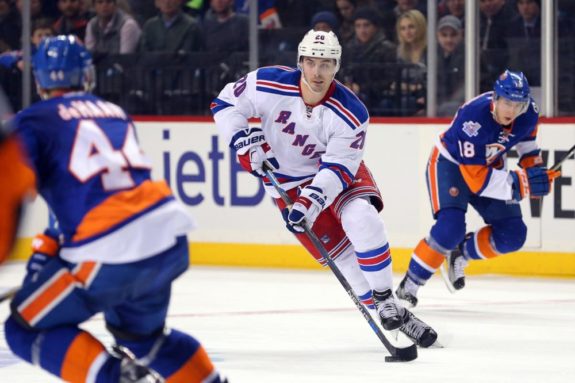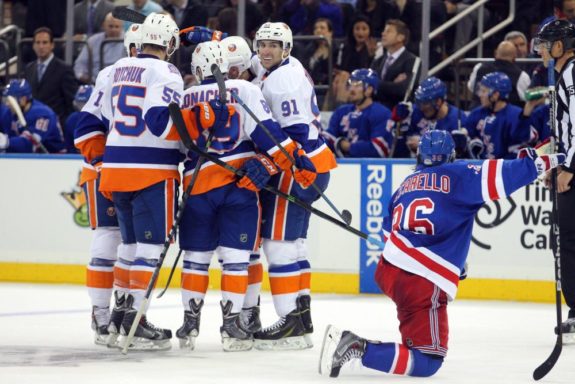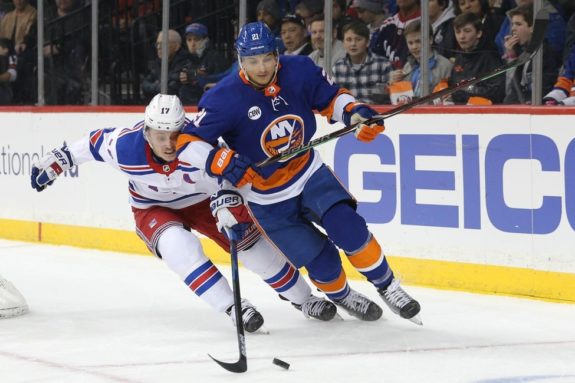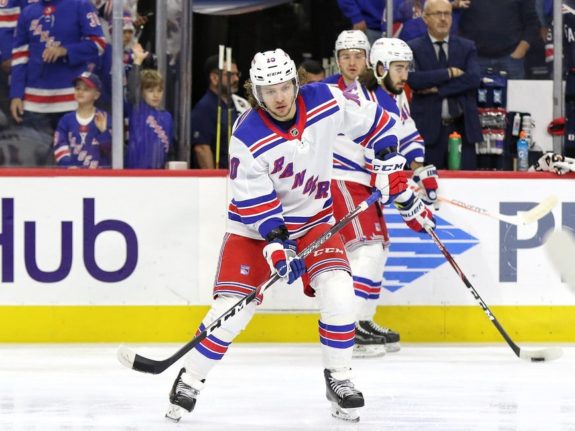The New York Rangers are in the midst of a nine-day span in which they play their state rivals, the New York Islanders, three times — twice at home at Madison Square Garden and once at the Nassau Veterans Memorial Coliseum. It’s an oddity in the schedule and yet it’s built excitement in the New York community; it feels like this is the rivalry to watch this season.

Look no further than the events of game one on Monday, Jan. 13. After the Islanders scored 18 seconds in, a pair of fights broke out soon after, resulting in both Islanders winger Matt Martin and Rangers defenseman/forward Brendan Smith being ejected from the game. After the Blueshirts tied it up later in the first, they outscored the Isles 5-1 over the last 40 minutes to take the win.
While the game on Jan. 16 didn’t have fights, there was still plenty of intensity, with the Rangers needing to tie the game in the second and giving up a one-goal lead in the third before Chris Kreider won the game in the waning seconds.
The Rangers vs. Islanders rivalry was based on the latter being the “little brother” team in New York — even with the Islanders’ newfound success while the Rangers rebuild. Combine that with Artemi Panarin spurning the Islanders to sign with the Rangers, and the lack of success from other Rangers rivals like the New Jersey Devils and Philadelphia Flyers, this rivalry has become the Rangers’ most prominent.
Rangers vs. Islanders History
The Rangers vs. Islanders rivalry may not have the legacy of an NHL “Original Six” matchup. Even the Rangers vs. Devils feels like the more prominent “local” rivalry, while some may view the Rangers vs. Flyers or Rangers vs. Boston Bruins as feuds with more bad blood — given the intense rivalries between the cities across the other major North American sports leagues. But the Rangers vs. Islanders matchup has quite a history.

The feud dates back to the Islanders’ establishment in 1972 during a time when the NHL tried to limit the expansion of the rival WHA. Since then, the two New York teams have met in the postseason eight times. Since 2001, the winner of the regular-season series is awarded the Pat LaFontaine Trophy and the losing club must make a $50,000 charity donation.
Almost every time these clubs meet things get physical. One of the most notable moments in the feud was on Feb. 25, 1979, when the Islanders’ Denis Potvin broke the Rangers’ Ulf Nilsson’s ankle on a hit, sparking the well-known “Potvin sucks!” chant from Rangers fans — a chant used even when the Islanders aren’t playing at MSG.
The Islanders went from a league-worst start in its inaugural season to quickly becoming one of the better-performing teams. They went from a 12-60-6 record and 30 points in 1972-73 to a 33-25-22 record and 88 points in 1974-75 (earning a playoff spot for the first time) — a postseason where they eliminated the Rangers — before getting triple-digit points in seven of their next nine seasons.
While it took several attempts to claim a Stanley Cup, the Long Island team finally did so in 1979-1980, the start of four straight championships and five straight Stanley Cup Final appearances. This era also marked the Isles taking control of the regular-season head-to-head battles between the two clubs. From 1975-76 to 1994-95, the Rangers were able to win the regular-season series between the teams just three times.

The Manhattan-based franchise did win the Stanley Cup in 1994, however, and soon shifted the head-to-head momentum their way. The Rangers won 13 of 21 meetings between 1995-96 and 1998-99 and then won the regular-season series eight times out of 10 between the 2003-04 and 2013-14 seasons.
Some may consider the Islanders the more successful of the two New York franchises based on their dynasty run of the 1980s and winning the same number of Stanley Cups as the Rangers in a much shorter span of existence. The Isles, however, seem to never be able to overcome the Blueshirts holding more prestige as an original franchise and actually being based in New York City, rather than Long Island.
Today: More Meaningful Than Devils, Flyers?
Despite the Rangers’ success in the New York rivalry in the late 1990s and early-mid 2000s, it seemed to take a back seat as both teams struggled. By the time the Rangers’ Stanley Cup window re-opened, the Devils were the better competition — and there were more Rangers and Devils fans than Islanders fans in the five boroughs of New York City.
These days, it seems like the all-New York rivalry feels fresher and holds more prestige. The Islanders are right now one of the top and most competitive teams in the Eastern Conference, while the Rangers have young talent that makes them exciting to watch — and both teams are giving their fans bright hopes for the future. In addition to the Isles trying to overcome the shadow they’re stuck in, they can give the Blueshirts tests to how they can hang with some of the conference’s best.

Coincidentally, Rangers vs. Devils (aka the Hudson River Rivalry) lost some steam in recent years as both franchises entered rebuilds. There was thought some momentum could return thanks to New Jersey drafting Jack Hughes and New York drafting Kaapo Kakko in back-to-back picks — as well as acquisitions on both sides, such as P.K. Subban and Panarin.
But those thoughts have since been dashed with a season of failed expectations for the Devils, who sit at the bottom of the Metropolitan Division with just 41 points and a 17-24-7 record. The struggling season has seen the team trade former MVP Taylor Hall and dismiss head coach John Hynes and general manager Ray Shero.
There’s still the classic Rangers and Flyers feud, sparked this offseason by Philadelphia’s acquisition of former Blueshirt Kevin Hayes and head coach Alain Vigneault. But the remaining three games between the two this season won’t take place until there’s about a month or so left in the regular season.
If the standings stay roughly as is — and there’s no surge by the Rangers or collapse by the Flyers — the only focus by then might be if the Rangers (and other teams) can play spoiler on Philly’s playoff hopes. And the Flyers aren’t necessarily open to a rebuild like their Northeastern rivals — in fact, they seem to hate that term — but they are looking to get out of mediocrity and reach back-to-back playoffs for the first time since 2010-11 and 2011-12.
Meanwhile, the Rangers and Islanders both had success in the 2010s, with the Blueshirts making the playoffs eight times and the Isles making it four times. And the Isles have shifted the edge in the head-to-head series back in their favor, winning 16 of 21 between 2015-16 and 2018-19.
In fact, the Islanders were looking to continue the success of their second-place Metropolitan Division finish and first-round sweep of the Pittsburgh Penguins by signing Panarin — who unanimously was determined to be the biggest free agent on the market.

But the “Bread Man” broke Isles fans’ hearts when Panarin signed a seven-year deal with the Rangers. Panarin reportedly took less money than the Islanders offered to sign with the Blueshirts, making it the second offseason in a row the Isles lost out on a big-name free agent despite being the front runner (they lost John Tavares to the Toronto Maple Leafs in 2018).
Panarin told Newsday in July, “I dreamt of playing for the Rangers. They’re in the Original Six, and my heart has been here.” (from ‘Rangers introduce Artemi Panarin, their dynamic new forward’, Newsday – 7/2/19).
Losing Panarin perhaps furthered the rivalry’s fuel of the Islanders playing in the Blueshirts’ shadow. Even at a time where the Rangers were at the worst they had been in a while, and the Islanders were having a resurgence to one of the best teams in the Eastern Conference, the Rangers were seen as the shinier, more lucrative franchise. Once again, the history, prestige and location were too much for the Isles to overcome.
For fans who tuned in to the first two games, it’ll be worth seeing how the intensity remains in the next two. For those who missed it, there are still a couple of chances to catch this action-packed rivalry. And if the Rangers can make the quick turnaround back to a playoff team they want, who knows where this rivalry can go as both teams try to get their fifth Stanley Cup before the other.